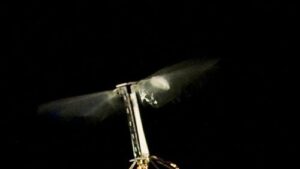People News
Limagrain Cereal Seeds has hired Hayley Butler and Zach Gaines as research associates assigned to Limagrain’s North American headquarters in Fort Collins, Col. Don Obert has been hired as wheat breeder for the company’s regional research station located in Battle Ground, Ind. Obert comes to Limagrain Cereal Seeds after nearly a decade as a research geneticist for the United States Department of Agriculture.
Rob Knapp has joined Spectrum Technologies Inc. as horticulture specialist. Knapp’s responsibilities include consulting, educating and promoting research conducted by the company’s nursery, greenhouse and vegetable industry segments. Knapp has over 20 years of experience selling soil-less growing media, fertilizers and pesticides to nurseries and greenhouses.
Valent U.S.A. Corporation has hired Geoff Quick as senior director of business development for its strategic licensing and acquisition activities. In his new role, Quick will be a member of the Valent U.S.A. executive leadership team, supporting all business development needs.
Michael Cawley, president and chief executive officer of The Samuel Roberts Noble Foundation, will retire on April 30, 2012, after more than 20 years of service. Cawley is the longest tenured president in the Noble Foundation’s 65-year history. Under his leadership, the foundation has experienced the largest growth in plant science and agriculture research programs and infrastructure since it was founded in 1945.
As of January 1, 2012, Jan Velema will withdraw as director of Vitalis Organic Seeds. Valema will continue to be involved within the organization as advisor. Henk Haitsma will be responsible for the daily management of Vitalis as of January 1, 2012. Haitsma will be director of Vitalis and continue in his current position as director of Enza Zaden Benelux.
SGS North America has hired Isaac Oyediran as the company’s new international field research business development manager in North America. Oyediran brings more than 10 years’ experience in pest management, agronomy and biotechnology for crop production to the SGS team. He will liaise between U.S. clients and the SGS global network, promote the utilization of existing SGS Laboratories for analytical work, and implement the marketing for new and existing service lines.
Harris Moran Seed Company has announced two strategic additions to its research and breeding organization. Mark Stowers joins the organization as vice president of research and breeding and will be based in Davis, Calif. Pat Mosely joins the company as director of large seed breeding and will be based in Sun Prairie, Wis.
BioWorks has hired Adam Conrad to join the company’s product development team as product development technician. In his new role, Conrad will participate as a project team member to turn new technologies into commercial products. Conrad will conduct laboratory and greenhouse experiments to evaluate new technologies and test current products
Beck’s Hybrids has hired Jim Zimmer to act in an advisory role. Zimmer will focus on the strategic development of Beck’s Hybrids’ growing business. Zimmer most recently served as chief executive officer of Channel Bio Corp. He has more than 20 years of seed industry experience, including serving as vice president of Monsanto’s U.S. branded business.
Bayer CropScience has named Jim Blome as president and chief executive officer and head of crop protection for the North American region, effective July 1, 2011. Blome succeeds Bill Buckner, current president and chief executive officer, who will retire at the end of the year.
Cibus Global has hired Michael Horn and Javier Narvaez-Vasquez, who will play key roles as members of its integral science team. Horn comes to Cibus with over 30 years of experience in developing plant biotechnology products. He will be a senior project leader with a focus on developing and improving cell culture systems. Narvaez-Vasquez joins Cibus as a senior scientist, and will be responsible for managing the development of non-transgenic crop traits in the collaborative program in flax with the Flax Council of Canada.
Product News
Stamina F3 Cereals’ fungicide seed treatment has received EPA registration for seed treatment use on small grains, including wheat, barley, rye, oats and triticale. “Healthier plants result from improved disease control against a broad spectrum of small grain disease threats, including common root rot and seed and seedling disease caused by fusarium species and Rhizoctonia solani,” says Gary Fellows, plant health technical manager for BASF SeedSolutions. Seed treatment application with Stamina F3 Cereals has been associated with more rapid and increased emergence of seedlings under certain cold conditions.
Certis USA has introduced Screen Duo, the latest generation of abiotic stress management technology that combines two modes of action, providing protection of high-value crops such as vegetables, melons, fruits, vines and seedlings from the outside and within. When applied, Screen Duo forms a reflective barrier film to protect the plant tissue from damaging ultra-violet light to reduce the overall temperature of the plant. In addition, Screen Duo contains a naturally-occurring compound found in all crops that triggers the innate stress mechanism to protect the plant from abiotic stress from within. This dual action provides superior protection at lower rates than competitive products, resulting in better yields and crop quality.
Syngenta has announced the launch of Vibrance, a proprietary seed treatment fungicide based on the new active ingredient sedaxane. Vibrance, which has been tailored specifically for the seed treatment market, protects major crops against a wide range of diseases carried in soil and air as well as against seed infection. Its properties also protect the entire plant root system. Vibrance will be combined with other Syngenta Seed Care compounds as a complete solution for cereals. The fungicide is now registered in Argentina for use on cereals. Further registrations for all major crops worldwide are expected over the next two years.
Business News
Beck’s Hybrids is expanding operations by adding a research building at its Atlanta, Ind., headquarters. The new facility will allow for future growth in testing the latest innovative seed technologies and germplasm from suppliers worldwide. “Our continued growth and expansion is driven by the increasing demands of our customers, who want more high-performing products suited for their acres,” says Sonny Beck, president of Beck’s Hybrids. Construction of the research building will be completed near the end of 2011, and is expected to add 72 new jobs by 2015.
Origin Agritech has announced a licensing agreement with a multinational partner to develop high-yielding corn varieties incorporating the Origin Agritech glyphosate-resistant and Bt-traits. Origin will license the traits to its partner and take the lead in the development and testing activities. “This agreement marks a milestone for Origin to validate our GM technology. After the successful integration of these traits, we would be looking to finalize subsequent collaboration agreements to sell these seeds into China, as well as other markets,”
says Irving Kau, acting chief financial officer of Origin.
SGS has acquired AG Research Associates LLC. ARA is a contract research organization for registration, research and development of new agrochemicals and seeds. It conducts bio-efficacy and GM efficacy trials, provides regulatory science guidance and recommendations for defense, development and registration of new agricultural products. ARA operates through a network of research stations in Georgia, California, Nebraska, Michigan and Texas.
DuPont business Pioneer Hi-Bred and Biotique Systems Inc. have entered into a research alliance to accelerate genetic discovery in agricultural crops globally. Under the agreement, Biotique will provide knowledge and access to its proprietary Titan solution for next-generation sequence management, marker analysis and genotype to phenotype association, as well as its Make-Sense intellectual property portfolio. DuPont will have access to the platform for agricultural applications, and will retain all intellectual property for its genetic information and crops produced as a result of the alliance.
Monsanto Company and Atlas Venture have entered a multi-year collaboration to explore investment opportunities in early-stage life sciences technology companies. Under the agreement, Monsanto will work with Atlas to identify strategic investments in a number of technology focus areas within agriculture to support and complement Monsanto’s interests and potential growth areas, including genomics, informatics and biology.
Bayer CropScience and DuPont have entered into a global licensing agreement for a canola herbicide tolerance trait. Bayer has licensed LibertyLink, its proprietary herbicide tolerance technology to DuPont business Pioneer Hi-Bred for use in canola hybrids. Pioneer will provide Bayer with access to certain proprietary juncea genetics. “As a result of the agreement, growers will have a broader choice of LibertyLink canola hybrids and the option to use the successful Bayer herbicide, Liberty, in their weed management program,” says Joachim Schneider, head of the BioScience business unit of Bayer CropScience.
Industry News
A new procedure devised by United States Department of Agriculture scientists and colleagues can improve polymerase chain reaction methods of detecting plant disease organisms. “PCR-based tests are valuable tools for diagnosing plant diseases. But the tests’ ability to obtain a genetic fingerprint conclusively identifying a culprit pathogen hinges on there being a minimum number of its cells. Otherwise, the pathogen’s genetic material can’t be probed and multiplied in amounts necessary for detection,” says plant pathologist Norm Schaad, formerly with USDA’s Agricultural Research Service. Schaad and colleagues devised a preliminary step called Bio-PCR which increases sensitivity by 100 to 1,000-fold over conventional PCR methods. The research was published in the April 2011 issue of Agricultural Research magazine.
Michigan State University will use a $4.1 million grant from the National Science Foundation to unlock plants’ biochemistry secrets. Using cultivated and wild tomato species from the Andes Mountains, Robert Last, MSU Barnett Rosenberg chair of Biochemistry, will lead a team of plant scientists to uncover how plants evolve to make compounds necessary for their survival. Last and collaborators, who study functional genomics and how plants produce diverse chemicals and metabolites, will work to determine the specific genes that control chemical evolution and plant metabolism. Insight into these plants’ mechanisms can help researchers develop strategies to make plants more resistant to disease and insect damage, and help increase productivity of cultivated crops.
A new “corn atlas” will help plant scientists navigate vast amounts of gene expression data from the corn plant, as described in the May 10, 2011 issue of The Plant Journal. The atlas, developed by a team of scientists from the University of Wisconsin-Madison and Michigan State University, tells researchers which of corn’s 50,000 genes are actively expressed in various parts of the plant during each of the major stages of plant development. “The atlas is basically the whole landscape of the plant’s transcriptome. It contains information about all of the genes in corn—where they’re expressed and when they’re expressed,” says Rajandeep Sekhon, the study’s co-lead author, a research associate in the Great Lakes Bioenergy Research Center at UW-Madison.
Scientists at the Fraunhofer Institute for Electron Beam and Plasma Technology FEP in Dresden, Germany have developed a process for effectively and efficiently freeing seeds of pathogens such as bacteria and fungi. The Fraunhofer Institute has for some years had a proven technology for effectively rendering pathogens such as bacteria and fungi on seeds harmless. The process utilizes low-energy electrons to kill germs. The special configuration of the equipment means that the seeds are separated and that the electrons can bombard the seeds from all sides. The electrons only act on and in the seed coat, and the ability of the seeds to germinate and the DNA of the seeds are not adversely affected.
Industry News is geared to seed professionals and delivers the people, industry, business and product news you need to know. Submissions are welcome. Email us at news@issuesink.com.












